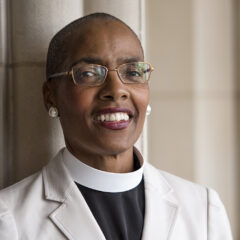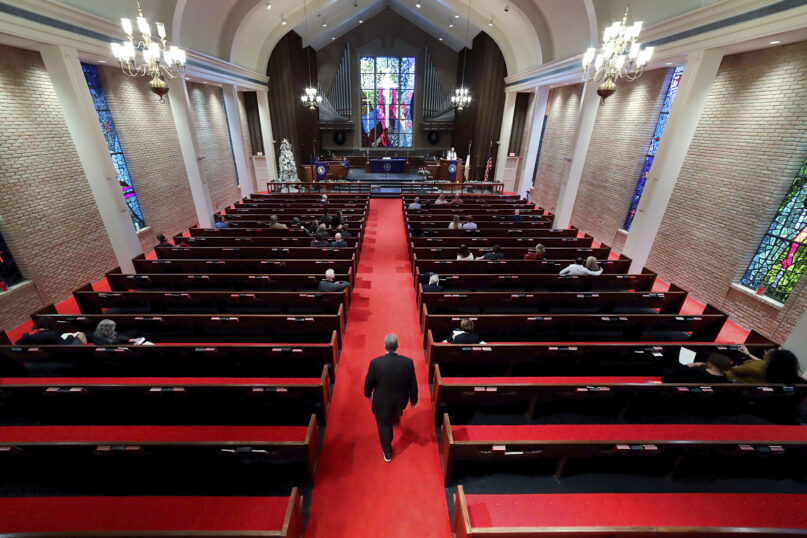(RNS) — In every church, in every place of worship and in every theological school there are conversations happening right now on how to rebuild after a prolonged pandemic that saw church attendance dwindle and empty pews replaced with online worshippers. More than two years later, many of us are waiting for our congregations and enrollments to return to pre-pandemic numbers — to get back to normal.
That may be a folly and a missed opportunity in more ways than one.
Not only does an attempt to return to life as it was before fundamentally fail to recognize the world has changed and there may be no going back, but it also errs in its assumption that going back is better than driving forward. Should we, as a church community, strive to return to the “normal” marked by the inequities of poverty, homelessness, health and educational neglect? Do we want a return to the inhumanity that was racism and anti-Blackness?
These issues created the conditions for our nation’s disproportionate COVID-19 deaths, with poor communities and communities of color bearing the brunt of them.
COVID-19 triggered profound societal changes while widening preexisting racial and political biases. Around the country, racial violence increased and anti-Black white supremacy found air to fan its flames. And churches and seminaries were given a platform to voice their thoughts on these national polarizing issues.
This brought forth new advocates, programs and ways for the church to make a greater impact, which should have shifted our charge from returning to normal to rededicating ourselves to a more just future.
The church and seminaries now have two options: cling to their history and lose sight of the massive progress that has been made or realize we are in a kairos time that requires us to chart a new path forward. Such times are often chaotic or moments of crisis, but they are also periods in which God is fully present and providing a way to God’s future.

Photo by Jeyaratnam Caniceus/Pixabay/Creative Commons
For anyone who chooses the latter, my time serving as dean of the Episcopal Divinity School at Union Theological Seminary during the COVID era has shown how churches and seminaries can grow while remaining at the forefront of the “new normal.”
First, we fully embraced the pandemic-driven change. Online church and online seminar classes will continue to play a critical role in the future of religion and theological education. However, churches must expand to reach congregations that do not have resources for online worship. These congregations are very likely those that serve poorer communities who are struggling to survive. They can no longer be left without resources for their physical and spiritual well-being.
Second, churches and seminaries should focus less on gathering and more on connecting. During COVID, EDS at Union pivoted to online programming, but we also pivoted in another way. Understanding that this era of COVID-19, anti-Black white supremacy and racism was a kairos time, we launched a “Just Conversations” series to learn more about the realities of inequity and injustice that were normalizing the disproportionate deaths of people of color. We explored what it meant to be a church and seminary amid that.
As a result, we saw tremendous power in making our programs more accessible so others might also learn. This series brought its participants not only a deeper understanding of the issues but a forum where people could build deeper connections with each other and with the church.
Churches and seminaries have a new responsibility to increase awareness of the issues facing our vulnerable communities. At EDS at Union, we developed the online Anglican Studies Social Justice Formation Program, grounded in theological and biblical analysis to help us better understand our call to confront the disparities in society based on gender, race, class, sexuality and other marginalizing forces.
The online platform provided wider access to those who are interested in engaging with these questions from a theological and biblical foundation, but who do not have access and resources for in-person/residential theological education. In expanding our programming to a broader audience, we discovered a hunger for theological discourse and a passion to understand the relationship between the gospel and social justice.
Lastly, for churches and seminaries that are struggling to see the new way forward, the answer may be in building partnerships with churches and other institutions to provide access to theological education. These relationships are mutually beneficial because they provide a unique opportunity to share knowledge, resources and audiences. If the goal is to create a more just church that shows the way to a more just future, we do that through creating partnerships that help us to grow together.

The Very Rev. Kelly Brown Douglas. Photo courtesy of Washington National Cathedral
A post-pandemic world presents opportunities for a transformative theological education, thus fostering ministries that will foster a more just society. We will not be able to capitalize on these opportunities by going back to normal. Change is demanded if the church wants to continue to be a relevant witness to the gospel of Jesus Christ.
(The Very Rev. Kelly Brown Douglas is an Episcopal priest and author of “Resurrection Hope: A Future Where Black Lives Matter.” She is the dean of the Episcopal Divinity School at Union Theological Seminary and holds the Bill and Judith Moyers Chair in Theology at Union. The views expressed in this commentary do not necessarily reflect those of Religion News Service.)





